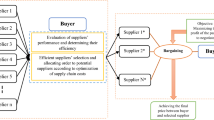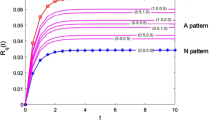Abstract
The problem of two-sided (bilateral) matching is a process of matching demanders and suppliers reasonably in supply chain. The vast majority of existing researches are based on a single-stage static evaluation information. It is necessary to consider the dynamic evaluation information during multiple stages since the performances of both matching parties have some certain dynamic characteristics. To address the problem, this paper proposes a two-sided matching method based on multi-stage dynamic reference points, because the decision-makers often focus on the level of gain or loss of the evaluation object relative to a reference point in the view of prospect theory.
Access this chapter
Tax calculation will be finalised at checkout
Purchases are for personal use only
Similar content being viewed by others
References
Fan, Z.P., Zhang, X., Chen, F.D., Liu, Y.: Multiple attribute decision making considering aspiration-levels: a method based on prospect theory. Comput. Ind. Eng. 65(2), 341–350 (2013)
Gale, D., Shapley, L.S.: College admissions and the stability of marriage. Am. Math. Monthly 69(1), 9–15 (1962)
Kai-kai, Y., Jian-jun, Z., Ming, Z., He-hua, W.: Analysis on the main manufacture-supplier cooperative strategies of airliner based on dynamic games of incomplete information. Chin. J. Manage. Sci. 025(5), 125–134 (2017)
Tversky, A., Kahneman, D.: Prospect theory: an analysis of decision under risk. Econometrica 47(2), 263–291 (1979)
Tversky, A., Kahneman, D.: Advances in prospect theory: cumulative representation of uncertainty. J. Risk Uncertain. 5(4), 297–323 (1992)
Wetzstein, A., Hartmann, E., Benton Jr., W., Hohenstein, N.O.: A systematic assessment of supplier selection literature–state-of-the-art and future scope. Int. J. Prod. Econ. 182, 304–323 (2016)
Author information
Authors and Affiliations
Corresponding author
Editor information
Editors and Affiliations
Rights and permissions
Copyright information
© 2021 The Author(s), under exclusive license to Springer Nature Singapore Pte Ltd.
About this paper
Cite this paper
Yu, H., Cui, M., Wang, G., Chen, X. (2021). A Two-Sided Matching Method Based on Multi-stage Dynamic Reference Points. In: Chang, V., Ramachandran, M., Méndez Muñoz, V. (eds) Modern Industrial IoT, Big Data and Supply Chain. Smart Innovation, Systems and Technologies, vol 218. Springer, Singapore. https://doi.org/10.1007/978-981-33-6141-6_33
Download citation
DOI: https://doi.org/10.1007/978-981-33-6141-6_33
Published:
Publisher Name: Springer, Singapore
Print ISBN: 978-981-33-6140-9
Online ISBN: 978-981-33-6141-6
eBook Packages: Intelligent Technologies and RoboticsIntelligent Technologies and Robotics (R0)




